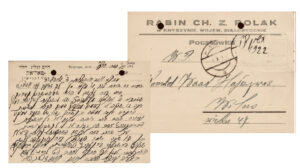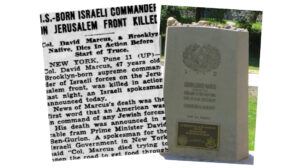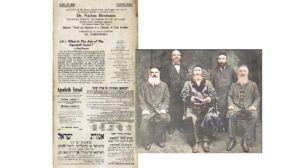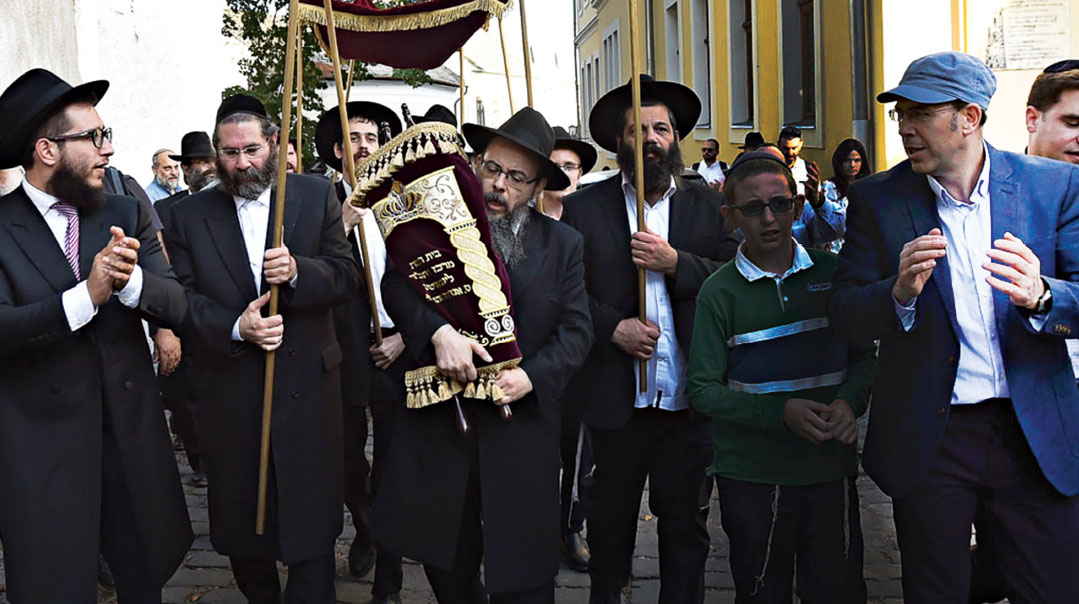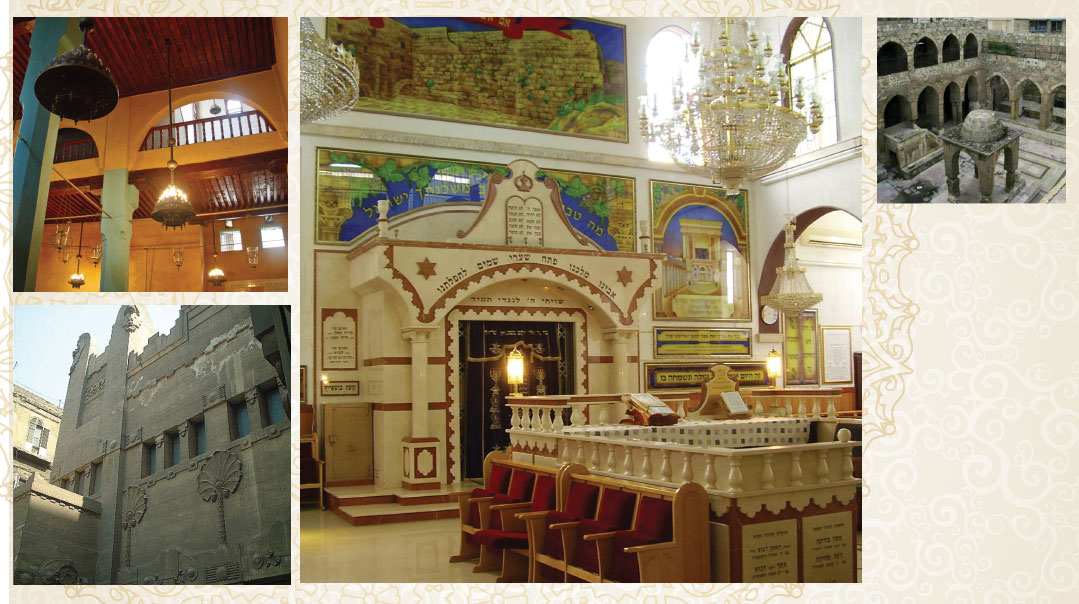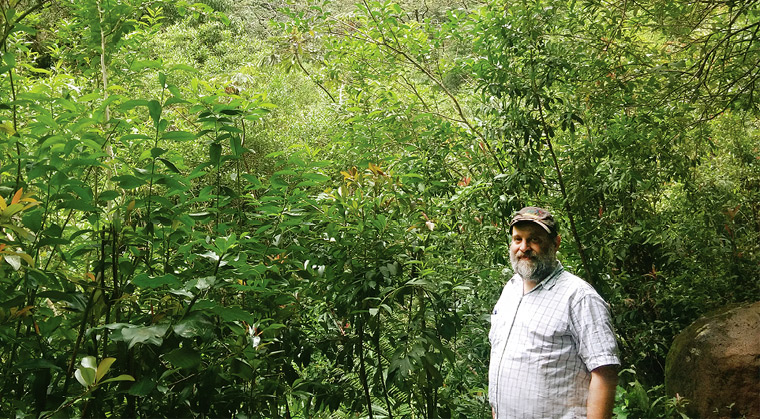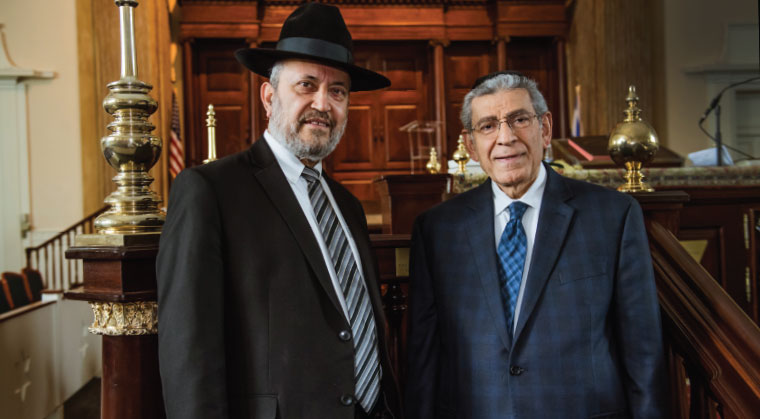When Havana Was a Haven
| September 13, 2017When World War II broke out, many European Jews who hoped to flee to the United States found themselves detouring through Cuba

Photos: Family archives
“Esta es la tierra más hermosa que ojos humanos han visto —This is the most beautiful land that human eyes have ever seen” — is one of Christopher Columbus’s most remembered utterances. Columbus was searching for a shortcut to India, a land famous for its fabulous silks and spices, and not for a tropical paradise. As happened elsewhere with the lands in the New World that Columbus claimed for the Spanish crown, Cuba wasn’t just a profitable discovery for the Spaniards, it was also one of the places to which Anusim escaping from the Spanish Inquisition fled.
History repeated itself almost 450 years later when Jews escaping from Nazi-occupied Europe sought a temporary haven in Cuba while they waited to receive US visas. For some of them, the long voyage across the Atlantic Ocean ended in tragedy. Most of the 937 passengers on board the St. Louis, which set sail from Hamburg, Germany, in May 1939, for instance, were refused entry when their ship reached Havana; only those who already possessed valid US visas were allowed to disembark. When the US refused to relax its immigration regulations and admit the remaining 907 passengers, the ship was forced to return to Europe.
But soon afterward Cuba once again opened its doors. Among those who found a safe haven on the island were 250 Jewish families from Belgium.
On the Run
When Germany invaded the Low Countries — Belgium, Holland, and Luxembourg — on Friday, May 10, 1940, Dr. Aaron Nussbaum was a nine-year-old Jewish child living in Antwerp. Nearly eight decades later, the retired Toronto principal and popular lecturer recalls, “Our family immediately left Antwerp for Brussels, and my grandparents joined us after Shabbat. We booked tickets on a train to Paris, but because of the war we were diverted to a suburb of Toulouse, in Southern France.”
Less than six weeks later, France also fell to the German army. Aaron’s father began to work on finding a way out of Europe, and eventually procured affidavits from relatives in the US, followed by a visa. In 1941, Aaron, his parents, and sister traveled to the port of Marseille to begin their voyage to the States. “My grandparents remained near Toulouse, thinking that no one would bother elderly people,” he says.
After Japan attacked Pearl Harbor on December 7, 1941, the United States declared war on the Axis Powers and all visas were revoked. Overnight, the Nussbaums and hundreds of other Belgian Jews were trapped in hostile France.
Dr. Nussbaum’s family obtained a laissez-passer to Cuba, with China as their official final destination. Aaron’s father had brought some money from Antwerp, as well as some diamonds sewn into clothing. But his son stresses that Jews who couldn’t pay for the fare were helped by the American Joint Distribution Committee, which also commissioned ships to transport Jews escaping from Europe.
Mr. Jacob Censor, today of Kew Gardens Hills, is another native of Antwerp. “We didn’t flee our homes in Antwerp because of the specter of concentration camps and mass shootings — we didn’t believe that could ever happen to us,” he explains. “Rather, we left because of the German bombardment; we wanted to get out of the path of war.”
The three Censor families left their homes in Antwerp in 1940, and made their way to rural France. When the German armies advanced into France, the family decided to escape further. Few doors were open to the increasingly desperate Jewish refugees. Some obtained visas to British-controlled Jamaica, or to Siam (present-day Thailand) or China. The Censors originally set their sights on Brazil and obtained Haitian transit visas to facilitate this, but this plan was foiled by some informants and fell through. Next, they were beneficiaries of the altruism of righteous gentile Aristides de Sousa Mendes. Sousa Mendes, a Portuguese consul stationed in Bordeaux, went against the orders of the Portuguese Salazar regime and issued thousands of Portuguese visas to French and Belgian refugees.
The Censor family traveled through Spain and spent a year in Portugal. Portugal wasn’t hostile toward Jewish refugees, but they were afraid the Germans would arrive there, too. “We wanted to reach America, and knew that several people had successfully applied for US visas from Cuba,” says Mr. Censor. “We traveled by ship to Havana. When our boat docked, my father disembarked to apply for visas at the US consulate, while we remained on the boat. This had worked for many before us, but just then the US declared war on Japan. The visas were refused and we ended up in Cuba. We were among the first boatload of Belgian Jewish refugees to be stranded in Havana.”
Despite the precarious situation, Dr. Nussbaum says that the children, at least, enjoyed the adventure, especially their two-week stop in Casablanca. “I remember seeing Senegalese troops, and it was the first time I had encountered black men. We spent two weeks in a DP camp. There were Moroccan Jews who sold us milk and were very nice to us, and someone was selling tefillin and some volumes of Gemara.” With striking foresight, Aaron’s father took the opportunity to purchase tefillin for him in Casablanca. His son was nine, and war was raging all over the world; who knew whether kosher tefillin would be available in Cuba?
When the group sailed to Havana aboard the Portuguese ship Serpa Pinto — the same vessel that had carried the Lubavitcher Rebbe to America two years earlier — the journey took 14 days, far longer than usual. By then, the ship had to veer southward to avoid German sea mines.
Mr. Chuni Fuchs, who today lives in Brooklyn, was another Belgian child whose family escaped to Havana via Lisbon. He recalls a tranquil journey under sunny blue skies, on a Portuguese boat named Colonial, which was chartered by the Joint. “Before we left Lisbon, some of the Yidden arranged a kosher shechitah. The captain of our boat agreed to let us use the second-class kitchen, so Rav Brodt of Antwerp guided my mother and my aunt in how to kasher it, and the chef cooked kosher under my mother’s supervision. Some of the secular Jews also joined us for the meals.”
Havana, Here We Come
Over the centuries, several waves of Jewish immigrants arrived in Cuba. When Cuba was temporarily handed over to the United States in 1899, after the Spanish-American War, some American Jews moved there and worked for American-owned companies. During the first few decades of the 20th century, thousands of Sephardim from Turkey and North Africa and Ashkenazim from Eastern Europe came to Cuba. Most intended it to be a stopover while they waited for their US visas to arrive, but many decided to remain and by 1924 Cuba’s Jewish population had grown to about 24,000.
But Cubans weren’t totally immune to the virulent anti-Semitism that was spreading across Europe; nor were they unaffected by the Great Depression, which had caused economic havoc throughout the world. Not everyone welcomed the idea of letting in Jewish refugees from Europe. Although 3,000 Jewish refugees were admitted during 1938-1939, the Jews aboard the St. Louis who didn’t have US visas were turned away. Jewish refugees were once again admitted during the early 1940s, but in April 1942, the Cuban government issued a ban forbidding entry to anyone born in any of the Axis countries or in the territories occupied by the Axis powers. Jews still in Europe who had obtained a Cuban visa were informed that it was now invalid. Thus, families who managed to make it to Cuba before the doors closed — such as the Fuchs, the Nussbaums, and the Censors — were, indeed, very fortunate.
“After two weeks at sea, we arrived at the beautiful bay of Havana,” Mr. Fuchs recalls. “The water was so clear that if you threw a penny from on deck, the Cuban kids could swim down to retrieve it.”
The Cuban government initially welcomed the European Jews by interning them in Tiscornia, the “Ellis Island of Cuba.” The wealthier families paid their way out of internment soon after the group arrived. After two weeks, the others were released.
The Antwerpian families rented apartments in Vedado, a well-kept, middle-class suburb of Havana. Mr. Censor remembers his family’s new home well. “Every day, there was a delivery of ice for the ice box, and every second day, Havana’s kosher bakery sent a truck around Vedado to sell bread.” Unlike Europe in 1940, Cuba didn’t suffer from a food shortage. Dr. Nussbaum remembers his uncle, who had arrived in Vedado previously, offering him raisins, to the new refugee’s delighted surprise.
Mr. Fuchs adds that while there was plenty of food, meals were very simple because everything was homemade. “Someone went to supervise the milk, and we made our own butter. I remember shaking the cream. Obviously, you couldn’t buy any chalav Yisrael cheeses or ice cream.”
The Jews in exile quickly established a shul for themselves. Tellingly, they named it Machzikei Hadass Anshei Antwerpen, after their home community. It was a big beis medrash with nusach Sfard minyanim three times a day. At its height, around 250 families belonged to this community.
Near it, they rented an apartment dedicated to Tze’irei Agudas Yisroel, where the younger members of the community davened. Dr. Nussbaum recalls that it was a lively hub for the youth, led by Reb Aron Noach Blasbalg. “The Agudah youth movement was very active; they had their own tefillos in their premises, and got together for games and outings. I remember the ping-pong table there and the Agudah banner “Lechu Banim Shimu Li,” and I remember going on an Agudah trip to the planetarium in Cuba. They also arranged a Shabbaton in the countryside, although I didn’t participate in that. One of the Tze’irei people, Willie Censor, volunteered to tutor me in Gemara, which I deeply appreciated.”
Other youngsters in the Belgian group attended the Modern Orthodox youth group Banetiv and later Hashomer Hadati.
Dr. Nussbaum’s father had a distant family member already settled in Havana, who sent his children to the Yiddish school. “My father saw one textbook used in that Yiddish school, and he realized it contained Chumash stories with a Communist, atheist commentary. Where the Chumash says, ‘G-d said to Moses,’ they wrote ‘Es is gezugt gevoren tzu Moshe — It was said to Moses.’ So obviously I couldn’t attend that school.”
Instead, the Antwerpian children were enrolled in the local non-Jewish, Spanish-speaking schools from 9 a.m. to midday or 3 p.m., and a Talmud Torah was established for afternoon Torah studies. Several eminent Torah personalities who found themselves stranded in Cuba led the kehillah and taught in the Talmud Torah.
Among them was Rav Shmuel Alter, who served as unofficial rabbi of Anshei Antwerpen. Rav Alter had escaped from Vienna after the Anschluss. He was a mechutan of the famous Galician gadol Rav Meir Arik ztz”l. Rav Alter traveled to Cuba with his wife and 18-year-old daughter, who tragically passed away from typhus as the boat docked. After his arrival in the United States he became rav of the Sadigur shul in Brownsville.
“Rabbi Alter had his entire seforim library with him in Cuba, and he taught us Chumash with Rashi,” Dr. Nussbaum recalls. Later, this scholar put together a collection of 20 seforim entitled Likutei Basar Lekutei on Chumash, Pirkei Avos, the five megillos, and the Aggadic sections of Talmud Bavli.
Reb Yitzchak Rosenberg of New York was also a child refugee in Vedado and attended the Talmud Torah. He mentions the lifetime impact of Rav Usher Schwebel (Segal), a distinguished talmid chacham who later joined the Nitra yeshivah in Mount Kisco, NY, and who taught the second class in the Havana Talmud Torah. Dr. Mendel Friedman was a scholarly physician who taught the youngest group. “They taught us boys how to learn,” Mr. Rosenberg says.
Other notable personalities were Rabbi Shloime Rottenberg, author of the history sefer Toldos Am Olam, who mesmerized the children with his stories; Rav Teitelbaum, an American rabbi who came to Cuba to supervise kosher meat for export to the US; and also a choshuve talmid chacham and Bobover chassid from Cracow named Rav Gutman Gutwirth, who had been rosh hakahal in Antwerp before the war.
According to Jacob Censor, the Belgian refugees experienced little or no anti-Semitism. He recalls that the native Cubans would sometimes call them “Polakos,” or Poles. “They never referred to us as Jews,” he says. In fact, the Cubans referred to any European who wasn’t British as a Polako — even those who weren’t Jewish.
The Diamond District
While the children were in school or marveling at the exotic paradise that was their new home, the adults had more down-to-earth things on their mind — namely, parnassah. To sidestep Cuban fears that the refugees would take away Cubans’ jobs, the Jews had to agree not to work while they waited for their US visas. The Joint Distribution Committee had agreed to temporarily help the refugees, but their resources were limited.
Fortunately, many of the Jews from Belgium, as well as those from Holland, were skilled workers in the diamond industry. They therefore approached the Cuban authorities and asked permission to create a diamond-polishing industry in Cuba. Permission was granted after they agreed that 50 percent of the workforce would be Cuban and 50 percent refugees.
“One diamond polishing factory was established by the Monderer family, and they employed 30–40 people,” Mr. Censor recalls. “Friends of theirs, Belgian Yidden who had reached New York, sent the machines and the raw diamonds, and those who knew the trade worked on them. My father was a diamond merchant, so he opened a factory in Cuba. My older brother learned the diamond trade in Cuba and later worked in diamonds in New York.”
In just one year the Cuban diamond industry grew to more than 20 factories and employed about 1,000 workers, with Cuban locals learning the trade from the refugees. It attracted international clients, including wealthy Britons living in Rhodesia (present-day Zimbabwe).
Even though the refugees were leading relatively comfortable lives, their thoughts were always with the family members they had left behind in Europe. Although it was possible to receive mail from occupied Europe, albeit censored, because Cuba was a neutral country, news trickled in very slowly. Mr. Fuchs, whose extended family lived in Hungary, says that his family first heard about the deportations in 1941, but “one could not fully believe it at the time.”
The Nussbaums initially received a few postcards from the grandparents who had remained in France. Then there was an ominous silence. When the news did come, it was too terrible to believe. “When my mother found out about the deportations to Auschwitz, she became sick in bed,” Dr. Nussbaum recalls.
Taking Leave
The Nussbaum family stayed in Cuba for close to two years. They were one of the first of the Jewish community to receive their American visas, perhaps because they had already been approved before the December 1941 cancellations. “We finally completed our journey to America in 1943 — the year with the lowest immigration levels in all American history,” he says.
While Jacob Censor’s uncle received a US visa after a year and left Cuba in 1942, it took longer for the rest of the extended family. Jacob says he remembers taking part in several goodbye parties, until his own family’s turn came to immigrate to the United States in November 1945. His older sister married Reb Aron Noach Blasbalg in Vedado, and the couple also emigrated to the States, where Reb Aron Noach gave a well-known daf yomi shiur for 50 years.
When the war was over, some families chose to return to Belgium, where they took part in the successful rebuilding of the Antwerp kehillah. Others remained in Cuba while they waited to receive sponsorships from relatives in the US and obtain their US visas. Very few of the Belgian community remained in Vedado permanently.
After the 1959 communist revolution, almost the entire Jewish community fled to the United States. It soon became illegal for US citizens to visit Castro’s Cuba, so few of the World War II-era refugees ever returned to visit their temporary haven in Vedado. Instead, they did what Jews have always done during our long exile — they rebuilt their families and their communities in their new home.
(Originally featured in Mishpacha, Issue 677)
Oops! We could not locate your form.
